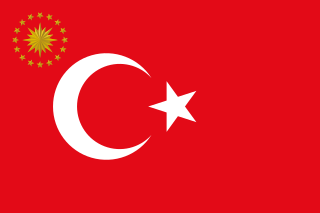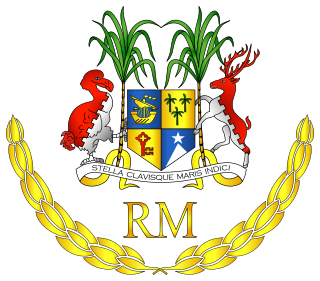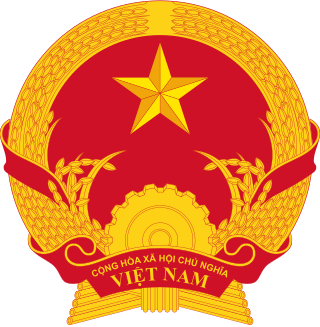A head of state is the public persona of a sovereign state. The specific naming of the head of state depends on the country's form of government and separation of powers; the head of state may be a ceremonial figurehead or concurrently the head of government and more.

Politics of Mauritius takes place in a framework of a parliamentary democracy. The separation of powers is among the three branches of the Government of Mauritius, namely the legislative, the executive and the Judiciary, is embedded in the Constitution of Mauritius. Being a Westminster system of government, Mauritius's unicameral house of parliament officially, the National Assembly, is supreme. It elects the President and the Prime Minister. While the President is voted by a single majority of votes in the house, the Prime Minister is the MP who supports a majority in the house. The President is the Head of State while the prime minister has full executive power and is the Head of Government who is assisted by a council of Ministers. Mauritius has a multi-party system. The Economist Intelligence Unit rated Mauritius a "full democracy" in 2022.

The president of France, officially the president of the French Republic, is the executive head of state of France, and the commander-in-chief of the French Armed Forces. As the presidency is the supreme magistracy of the country, the position is the highest office in France. The powers, functions and duties of prior presidential offices, in addition to their relation with the prime minister and government of France, have over time differed with the various constitutional documents since the Second Republic.
The politics of Tanzania takes place in a framework of a unitary presidential democratic republic, whereby the President of Tanzania is both head of state and head of government, and of a multi-party system. Executive power is exercised by the government. Legislative power is vested in both the government and parliament. The party system is dominated by the Chama Cha Mapinduzi. The Judiciary is independent of the executive and the legislature.

The president of Turkey, officially the president of the Republic of Türkiye, is the head of state and head of government of Turkey. The president directs the executive branch of the national government and is the commander-in-chief of the Turkish military. The president also heads the National Security Council.

The President of Pakistan is the head of state of the Islamic Republic of Pakistan. The president is the nominal head of the executive and the supreme commander of the Pakistan Armed Forces. The Presidency is a ceremonial position in Pakistan. The President is bound to act on advice of Prime Minister and cabinet. Asif Ali Zardari is the current President since 10 March 2024.

The president of the Republic of Mauritius is the head of state of the Republic of Mauritius. Mauritius is a parliamentary republic, and the president functions as a ceremonial figurehead, elected by the National Assembly as set out by the Constitution of Mauritius. The current office-holder is Prithvirajsing Roopun. He took the office on 2 December 2019. The president's official residence is the State House.

The Prime Minister of Pakistan is the head of government of the Islamic Republic of Pakistan. Executive authority is vested in the prime minister and his chosen cabinet, despite the president of Pakistan serving as the nominal head of executive. The prime minister is often the leader of the party or the coalition with a majority in the lower house of the Parliament of Pakistan, the National Assembly where he serves as Leader of the House. Prime minister holds office by virtue of their ability to command the confidence of the National Assembly. The prime minister is designated as the "Chief Executive of the Islamic Republic".

The president of the Socialist Republic of Vietnam is the head of state of Vietnam, elected by the National Assembly of Vietnam from delegates of the National Assembly. Since Vietnam is a single-party state, the president is generally considered to hold the second highest position in the political system, practically after the general secretary of the Communist Party of Vietnam. In addition, the president appoints the head of government, the prime minister. As head of state, the President represents Vietnam both domestically and internationally, and maintains the regular and coordinated operation and stability of the national government and safeguards the independence and territorial integrity of the country.

The president of the United Republic of Tanzania is the head of government.

The prime minister of the Republic of Korea is the deputy head of government and the second highest political office of South Korea who is appointed by the President of the Republic of Korea, with the National Assembly's approval. The prime minister may be a member of the National Assembly, but this is not required to hold the office. The prime minister of South Korea is not the head of government of South Korea, for the President is both the head of state and government in the country.

The line of succession to the Presidency of Pakistan is the order in which persons may become or act as the President of Pakistan upon the incapacity, resignation or death of an incumbent President. Pakistan, by law, has a parliamentary democratic system of government that has been modified several times since its inception. The prime minister of Pakistan is the head of the government, while the president of Pakistan, by law and by statute, is a constitutional figurehead.

The prime minister of Mauritius is the head of government of Mauritius. He presides over the Cabinet of Ministers, which advises the president of the country and is collectively responsible to the National Assembly for any advice given and for all action done by or under the authority of any minister in the execution of his office.

Salim Ahmed Salim is a Tanzanian politician and diplomat who has worked in the international diplomatic arena since the early 1960s. He served as prime minister for one year 1984–1985.

The Cabinet of Ministers of the Republic of Mauritius is the official council which advises the President of the Republic in the making of major decisions. It is led by the Prime Minister and a total of 23 ministers and the Attorney General, who is considered to be a cabinet member. The constitution of the Republic provides a cabinet under the leadership of the Prime Minister that must be appointed by the President after each general elections.

The Deputy Prime Minister of Mauritius is a senior member of the Cabinet of Mauritius. The incumbent Deputy Prime Minister Louis Steven Obeegadoo was appointed by the President on 25th of June 2020 after the resignation of Ivan Collendavelloo. The Deputy Prime Minister is the first in line to succeed the Prime Minister on a temporary basis in case the latter is out of the country, sick, resigns or dies suddenly.

The Constitution of the United Republic of Tanzania, also known as the Permanent Constitution, was ratified in 16 March 1977. Before the current establishment, Tanzania has had three constitutions: the Independence Constitution (1961), the Republican Constitution (1962), and the Interim Constitution of the United Republic of Tanganyika and Zanzibar (1964).

Elizabeth II was Queen of Tanganyika from 1961 to 1962, when Tanganyika was an independent sovereign state and a constitutional monarchy. She was also the monarch of other sovereign states, including the United Kingdom. Her constitutional roles in Tanganyika were mostly delegated to the governor-general of Tanganyika.

















